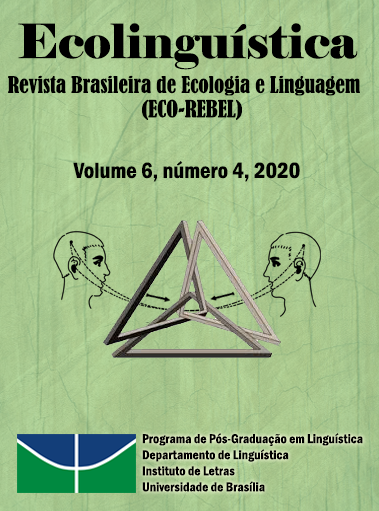An ecolinguistic perspective on the discourse of the Corona Virus
Keywords:
Discouro; pandemic; government; lockdown; people; metaphors.Abstract
Taking an ecolinguistic approach the paper analyzes how the corona virus pandemic has changed our lives and how people are talking and discoursing around the globe. The pronouncements of politicians and governments changed very quickly to accommodate to the new state of affairs. Employing strong language governments made their populations stay at home, to keep ‘social distance’, to prevent the spread of the disease. Very rapidly ‘medical’ talk of illness and death entered the public domain and was used by politicians. Medical experts like virologists and epidemiologists accompanied politicians on the media showing graphs and curves to explain what was happening.
Speakers used dramatic metaphors. There were war metaphors, and also disaster metaphors, like floods and tides, a house on fire to characterize how observers viewed what was happening. People constantly mentioned numbers and figures. Everyday discourse patterns were packed with medical and epidemiological terms and phrases. The pandemic discourse resembles Gramsci’s idea of ‘hegemony’. The dominating power of the pandemic has made us all party to this new hegemony. Daily news conferences about the pandemic filled the media and TV. Such a crisis is a favourable time for ‘good’ journalism, especially investigative work. Governments justify their actions by claiming to follow the advice of scientific experts. The tendency for academics to put themselves at the service of government is a well-known phenomenon, a form of linguistic co-opting.
Governments everywhere pitched economic orthodoxy to the winds. With talk about easing the lockdown the discourse began to change. German Chancellor Angela Merkel warned that Germany risked damaging its recent achievements in subduing the spread of Covid-19. The pandemic is an idea that exists in our social discourse and we talk about a phenomenon that actually exists as an external physical reality. The texture of everyday life and society feels unstable. So does the human position in the world. With the advance of globalization the risk of infectious diseases spreads. Some people see pandemics as blips rather than an integral part of history. They like to believe that humans are no longer part of the natural world and can create an autonomous ecosystem, separate from the rest of the biosphere. Engels’ comment on humanity’s hubris and expecting humans can conquer nature can serve as a cautionary tale. In ecological terms we need a non-hierarchical acceptance of all species, including humans as co-inhabitants of the natural world. This will not be easy.
Downloads
References
AGRE, P. (2000) ‘The Crisis of Public Reason’, Independent Media Center, Tuesday 15 Aug 2000. [http://www.indymedia.org:8081] (Accessed 28.02.2008).
ALEXANDER, Richard J. Framing Discourse on the Environment. A Critical Discourse Approach. New York: Routledge, 2009.
ALEXANDER, Richard J.; Arran STIBBE. ‘From the analysis of ecological discourse to the ecological analysis of discourse’. Language Sciences 41, 2014, p. 104-110.
BENNETT, Catherine (2020) ‘No 10’s coronavirus briefings: stick to the script and hope no one sees your nose growing’. The Observer, May 2 commentary. https://www.theguardian.com/commentisfree/2020/may/02/no-10s-coronavirus-briefings-stick-to-the-script-and-hope-no-one-sees-your-nose-growing
BUSH, Stephen. ‘Why it’s not too early for an inquiry into the government’s failings over Covid-19’. New Statesman 24-30 April 2020.
CHOMSKY, Noam. Deterring Democracy. London: Verso, 1991.
CUNNINGHAM, Andrew. ‘Covid-19-the-wildlife-facts’ 9th April 2020. https://www.zsl.org/blogs/science/covid-19-the-wildlife-facts
DORLING, Danny (2020) ‘Three graphs that show a global slowdown in COVID-19 deaths’
April 7, 2020. https://theconversation.com/three-graphs-that-show-a-global-slowdown-in-covid-19-deaths-135756
FLINDERS, Matthew; DIMOVA, Gergana (2020) ‘Bringing in the experts: blame deflection and the COVID-19 crisis’, 2020. https://blogs.lse.ac.uk/politicsandpolicy/
GRAMSCI, Antonio. Selections from the Prison Notebooks. London: Lawrence & Wishart, 1971.
GRAY, John. ‘Why this crisis is a turning point in history’. New Statesman 3-23 April 2020.
HALLIDAY, Michael A. K. ‘New ways of meaning. A challenge to applied linguistics.’ Journal of Applied Linguistics 6, 1990, p. 7-36.
HARDING, Luke. ‘Weird as hell the Covid-19 patients who have symptoms for months’. The Guardian 15 May 2020.
HODGE, Bob; FOWLER, Roger (1979) ‘Orwellian linguistics’. In: FOWLER Roger et al. Language and Control. London: Routledge and Kegan Paul, 1979, p. 6-25.
MALIK, Kenan. ‘Like a moth to a flame, we’re drawn to metaphors to explain ourselves’. The Observer 18 March 2020.
McNEILL, W.H. Plagues and Peoples. New York: Anchor Books, 1976.
NERLICH, Brigitte. ‘Metaphors in the time of coronavirus’, March 17, 2020 https://blogs.nottingham.ac.uk/makingsciencepublic/2020/03/17/metaphors-in-the-time-of-coronavirus
QUAMMEN, David. Spillover: Animal Infections and the Next Human Pandemic. New York: W. W. Norton Company, 2013.
SCHATZ, Adam. ‘Shipwrecked’ on Covid-19 in America, London Review of Books Vol. 42 No. 8 · 16 April 2020. https://www.lrb.co.uk/the-paper/v42/n08/adam-shatz/shipwrecked
STIBBE, Arran. Animals Erased. Discourse, Ecology, and Reconnection with the Natural World. Middletown, Connecticut: Wesleyan University Press, 2012.
TRAMPE, Wilhelm. ‘Euphemisms for Killing Animals and For Other Forms of Their Use’. In Alwin Fill and Hermine Penz (eds) Routledge Handbook of Ecolinguistics. London & New York: Routledge, 2018, p. 325-341.
WILLIAMS, Raymond. Problems in Materialism and Culture. London: Verso, 1980.
Downloads
Published
How to Cite
Issue
Section
License
Copyright (c) 2020 Ecolinguística: Revista brasileira de ecologia e linguagem (ECO-REBEL)

This work is licensed under a Creative Commons Attribution-NonCommercial-NoDerivatives 4.0 International License.
Authors who publish in this journal agree to the following terms:
Authors retain copyright and grant the journal the right of first publication. The work is simultaneously licensed under the Creative Commons Attribution License allowing the sharing of the work with acknowledgment of the authorship of the work and initial publication in this journal.
Authors are authorized to enter into additional contracts separately for non-exclusive distribution of the version of the work published in this journal (e.g., publishing in institutional repositories or as book chapters), with acknowledgment of authorship and initial publication in this journal.
Authors are allowed and encouraged to post and distribute their work online (e.g., in institutional repositories or on their personal page) at any point before or during the editorial process, as this can bring about productive revisions as well as increase impact.
Citation of published works (See The Effect of Free Access).



3.png)



